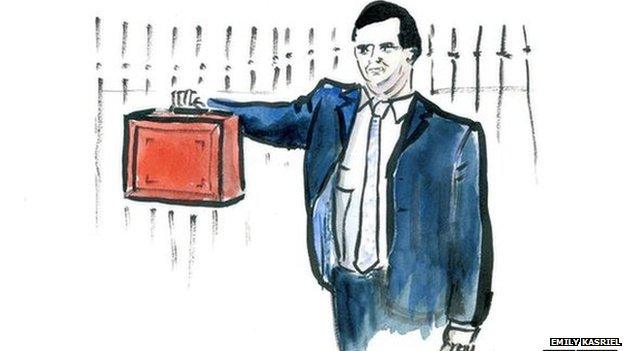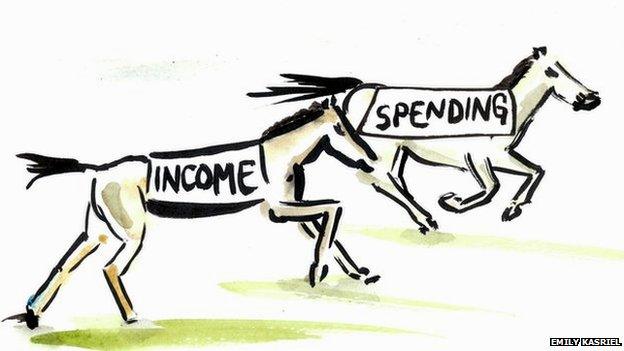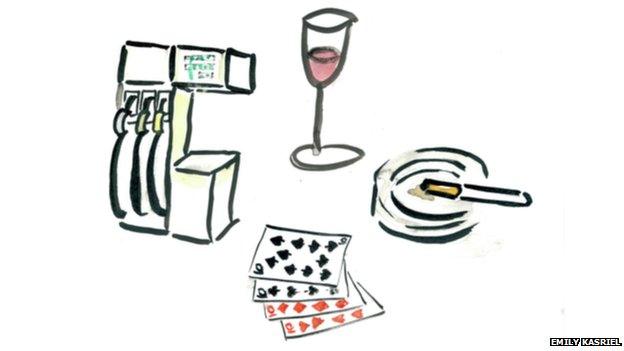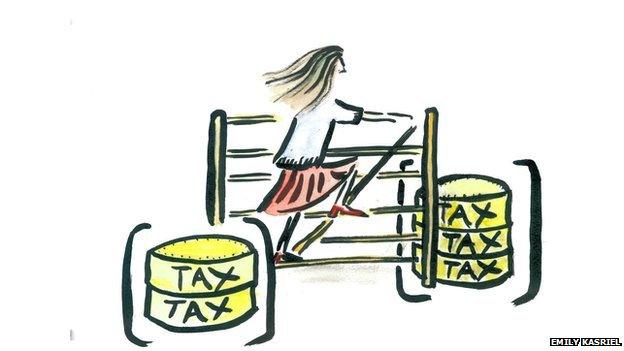Your guide to the Budget 2015 buzzwords
- Published
We bandy these words about: debt, deficit, duty, fiscal drag, especially at the time of the chancellor's Budget, but what do they actually mean?

The Budget
Strikingly obvious, really. Think of your own budgeting. The chancellor, though, only lays out how he's going to raise money - generally through tax but also borrowing - and what he's going to spend it on, once a year (usually). In the past few decades this has also involved commitments to future years. Many of us, of course, don't bother laying out our budgets, the salary and bills seem to take care of themselves. He has to make a Budget by law as certain taxes have to be approved each year by parliament.
Budget 2015, take two
We've already had one this year, but after a new government is elected, the chancellor, even if it is the same one, traditionally announces another one. This year, because the Conservatives no longer have to worry about what their former Liberal Democrat coalition partners think, they are free to spend the nation's money how they want. Like after divorce. Except they get to keep all the assets, the income, and, oh yes, the debts.
Chancellor of the Exchequer
Other countries call them finance ministers. Thomas Cromwell, Sir Robert Peel, creator of the police, and Sir Winston Churchill are former holders of the post. Chancellor just means official in Latin, roughly speaking. So that's boring. Exchequer is better. It refers to a special cloth that was used to place counters on. It looked like a chess board.
Debt
There have been arguments about this. Is it rising or falling? National debt - household and governments - in total, is rising. There's also debt as a percentage of the whole economy. That falls when the economy grows faster than that pile of debt. Like you've increased your mortgage but your property's value has gone up by more. In 2014-15, net UK debt stood at almost £1.5 trillion.

Deficit
The gap between income and spending. Simply, shrinking the deficit means either raising taxes or cutting spending. It is sometimes called the country's overdraft. A concept some think is fatuous as unlike households, governments can keep rolling over the debt for years, and inflation, still a usually occurring phenomenon, erodes it. The next generation does not have to wipe out the previous one's debts, as it does in a family.
Duty
Excise duty. Like VAT it is an indirect tax applied within a country to goods or services. Unlike VAT, which is charged at 20% of the sale price, it is often a flat amount levied to each item. It is applied commonly to tobacco, alcohol, gambling - and fuel. The fuel duty is the reason why motorists fume when oil prices fall yet petrol prices do not. That and VAT make up 65% of the price. It has been as much as 80%. Governments raise most excise duties in line with inflation. Fuel price rises though tend to annoy the electorate more than just about anything. Most Budgets have either cancelled or deferred increasing it in line with inflation.

Fiscal drag
The rate of income tax people pay depends on how much they earn: the higher their income, the higher rate of tax. In expanding economies, people's earnings are more likely to increase. In some cases, those people will cross an earnings threshold and find themselves paying a higher rate of tax. If this is widespread, it can act as a brake on how the economy expands, as people have less money to spend. However, it can also be seen as something that stops inflation rising too quickly.
Income tax threshold
Different rates of income tax are paid on different parts of incomes. People pay nothing on the first £10,600 that they earn. They pay 20% on anything between that and the next £31,785. After that it is 40% on anything higher until you get to an income of more than £150,000. Earnings above £150,000 are taxed at 45%. The "threshold" refers to the barrier between the tax rates. So once someone edges over a threshold, they pay tax at a higher rate on anything they earn above that level. Not, as some think, suddenly on the whole amount, meaning if you're approaching a pay rise that takes you into a higher tax band, you needn't worry you will actually take home less.

Levy
Bank levy. Effectively another tax; introduced in 2011 it is charged on the amount of debt held by all UK banks. Initially brought in at the sliver rate of 0.05% it has been quadrupled in that short time to 0.21%. That is too much for some. Analysts cite it as one of the reasons HSBC, which makes the bulk of its profits abroad but is based here and taxed here, wants to move its business base elsewhere. The levy raised more than £2bn last year, of which about a third came from HSBC alone.
Office for Budget Responsibility (OBR)
The OBR was created in 2010, external to provide independent and authoritative analysis of the UK's public finances. It has five main roles: producing five year forecasts; judging the government's performance against fiscal targets; scrutinising the Treasury's costing of tax; assessing sustainability of public finances; and assessing the government's performance against the welfare cap.
Personal allowance
The government allows every taxpayer to earn a certain amount before they start paying tax - the personal allowance. It sets a threshold below which people don't pay income tax. Bear in mind that people may earn below this threshold and still pay other types of tax (for instance, national insurance contributions, which raise a lot of the total tax take). In 2015-16, the UK personal allowance is £10,600.
Structural deficit
The structural deficit is a relatively new concept. It is basically the current budget deficit adjusted to strip out the cyclical nature of the economy. You would expect, for example, the budget deficit to get smaller when the economy grows. In other words, it's the underlying deficit that is not directly affected by general economic conditions.
Tax credits
Possibly the biggest political potato of this Budget. There are two types: Working Tax Credit and Child Tax Credit. They are paid to more than four million people who may be eligible if they earn less than £33,000 a year. The taxpayer spends some £30bn a year on them. Formerly barely mentioned, now that the government is planning to cut another £12bn from welfare spending, they are firmly in the spotlight. They were designed to make it worthwhile for people to come off unemployment benefits - even for more low-paid jobs. One argument in favour is that it is better to have people in work, even if that is subsidised to some extent. But some argue that they subsidise low wages, and therefore business profits. The government has begun saying that if these were cut, business would pay more to make up the shortfall.
Triple-lock
This is a term used to describe protections for increases in the state pension. Under the triple-lock scheme, the government promises to lift pensions by whatever is the highest out of: inflation, increases in average earnings or 2.5%. It guarantees that pensioners would see their pensions go up even if inflation is low.
Illustrations by Emily Kasriel